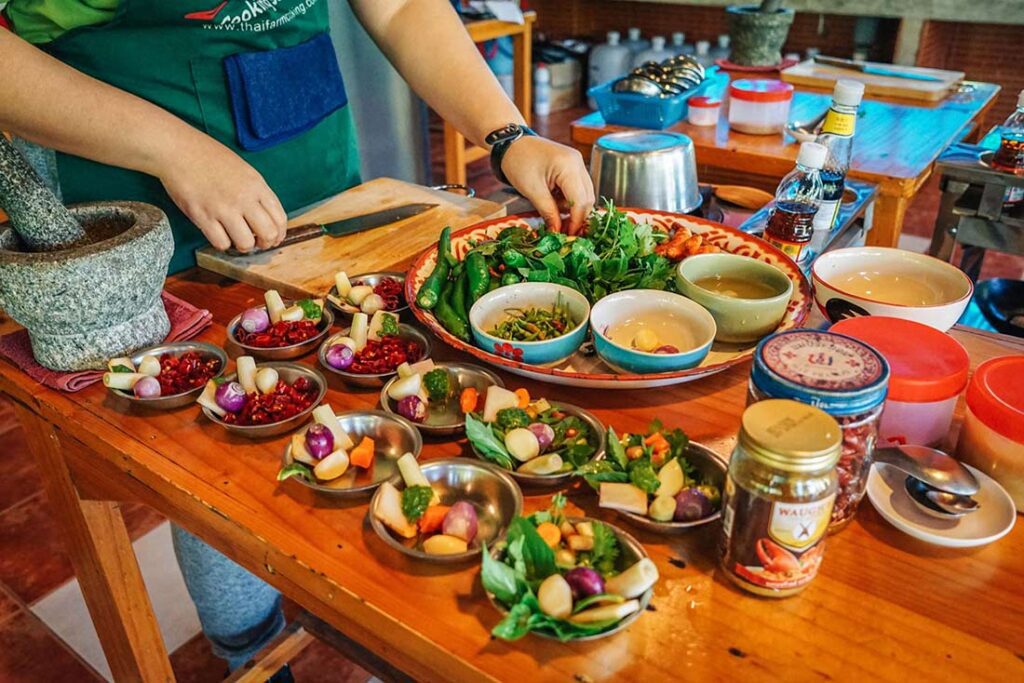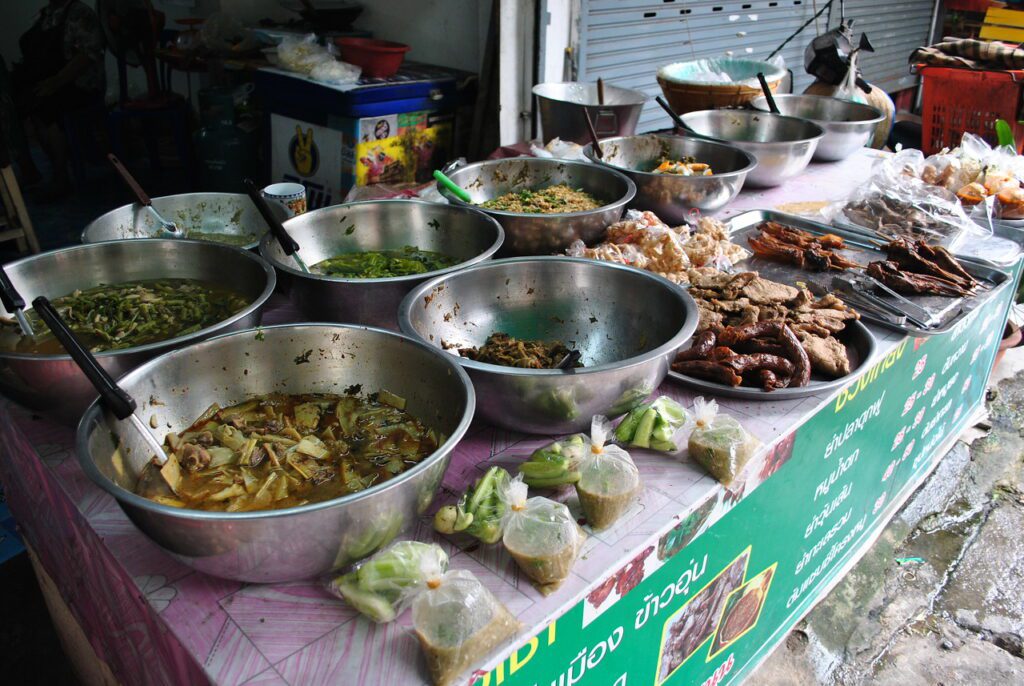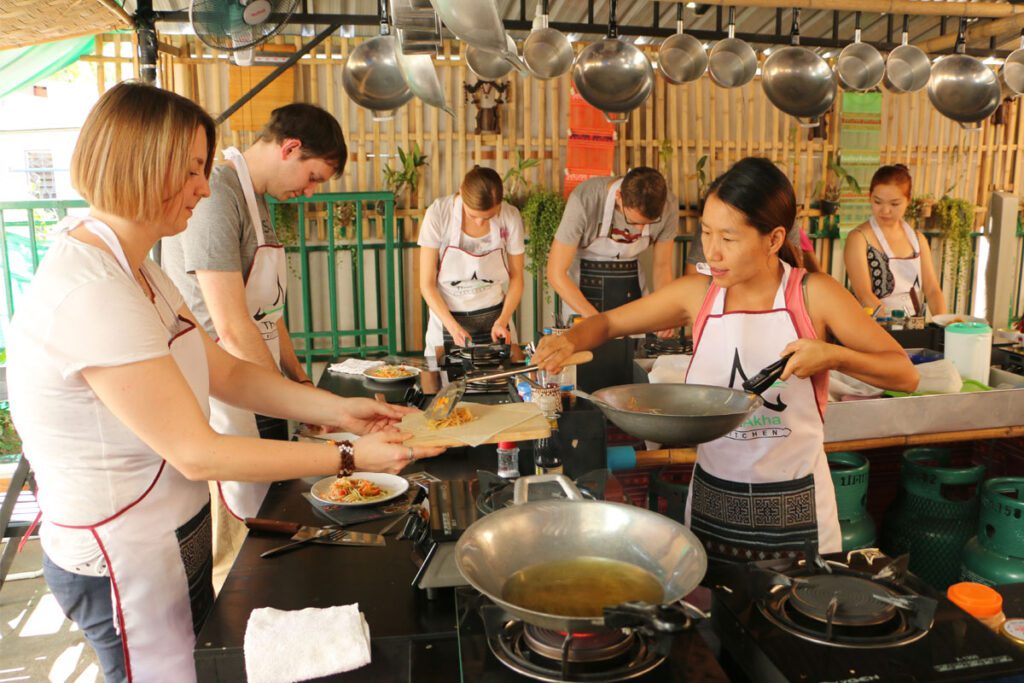Introduction to Thai Cuisine in Chiang Mai
Chiang Mai, nestled in the lush landscape of Northern Thailand, is not just a visual feast for travelers, but a culinary haven for those seeking to delve into the rich flavors and history of Thai cuisine. This city offers a unique blend of traditional dishes influenced by its diverse cultural heritage and geography.
Exploring the Flavors and History of Northern Thai Cuisine
Northern Thai cuisine, known as Lanna food, is distinct from the dishes of Bangkok and the southern coasts of Thailand. It’s characterized by bold flavors, earthy spices, and an emphasis on local, fresh ingredients. A key component of this cuisine is the balance of five fundamental tastes: sweet, sour, salty, bitter, and spicy.
Historically, Northern Thai food has been shaped by a variety of cultural influences, including neighboring countries like Myanmar and China. This fusion has resulted in a unique culinary tradition that includes famous dishes like Khao Soi, a creamy coconut curry noodle soup, and Sai Oua, a spicy and aromatic grilled sausage.
Understanding the Significance of Local Ingredients and Spices
The secret to the unique flavor profile of Northern Thai cuisine lies in its use of local ingredients and spices. Key ingredients include:
Galangal: Similar to ginger, but with a sharper, citrusy flavor.
Lemongrass: Used for its fragrant and citrusy notes.
Kaffir Lime Leaves: Adds a burst of citrus flavor to soups and curries.
Chilies: Used in various forms, from fresh to dried, to bring heat to dishes.
Tamarind: Provides a signature sourness in many Northern Thai dishes.
Selecting the Right Cooking School Experience in Chiang Mai
For those keen on learning the art of Thai cooking, Chiang Mai offers numerous cooking schools that provide hands-on culinary experiences. When selecting a cooking school, consider:
Menu Offerings: Look for schools that offer a range of dishes, especially those that specialize in Northern Thai cuisine.
Market Visits: Some schools include market tours as part of their classes, offering insights into the local ingredients.
Class Size: Smaller classes allow for more personalized instruction.
Vegetarian Options: If you have dietary restrictions or preferences, check if the school caters to these needs.
Authenticity and Environment: Choose schools that provide an authentic Thai cooking experience, possibly in a traditional setting.


Renowned Cooking Schools in Chiang Mai
Chiang Mai, a culinary heartland in Northern Thailand, is renowned for its cooking schools that offer immersive experiences into Thai cuisine. Each school has its unique approach, specialties, and ambiance, contributing to a rich learning experience. Here’s an in-depth look at some of the top Thai cooking schools in the city, along with testimonials from former students to provide real insights.
1. Thai Farm Cooking School
Unique Approach and Specialties: Set in an organic farm, Thai Farm Cooking School focuses on farm-to-table cooking. Students get to pick fresh ingredients from the farm and learn to cook a variety of Thai dishes.
Testimonial: “The experience at Thai Farm Cooking School was beyond my expectations. Picking our ingredients and cooking in the midst of nature was incredible. The flavors and techniques I learned have stayed with me.” – Emily, USA.
2. Baan Thai Cookery School
Unique Approach and Specialties: Located in the heart of Chiang Mai, Baan Thai offers a traditional cooking experience with a focus on classic Thai dishes. They emphasize hands-on learning in a home-like setting.
Testimonial: “Baan Thai Cookery School was a highlight of my Chiang Mai trip. The instructors were knowledgeable and the atmosphere was fun and relaxed. The Pad Thai and Green Curry I made were delicious!” – Mark, Canada.
3. A Lot of Thai Home Cooking Class
Unique Approach and Specialties: This cooking class is run by a local family and offers an intimate culinary experience. It’s known for its personalized approach and smaller class sizes.
Testimonial: “I loved the homey feel of A Lot of Thai. Yui, our instructor, was warm and patient, and the dishes we cooked were outstanding. It felt like cooking with a friend!” – Sarah, UK.
4. Asia Scenic Thai Cooking School
Unique Approach and Specialties: Asia Scenic differentiates itself by not just teaching how to cook Thai food, but also educating students about the philosophy and culture behind Thai cuisine.
Testimonial: “The cooking class at Asia Scenic was not just about the recipes; it was a deep dive into Thai culture. The knowledge of herbs and flavors I gained was phenomenal.” – Alex, Australia.
5. Chiang Mai Thai Cookery School
Unique Approach and Specialties: As one of the first cooking schools in Chiang Mai, it offers a comprehensive Thai cooking course with an emphasis on technique and ingredient knowledge.
Testimonial: “Chiang Mai Thai Cookery School offered a thorough introduction to Thai cooking. The chefs were experts and the dishes we made were authentic and tasty.” – Priya, India.
In conclusion, Chiang Mai’s cooking schools are more than just places to learn how to cook Thai food; they are gateways to understanding Thai culture, traditions, and the art of cooking. Whether you are a novice or an experienced cook, these schools offer invaluable experiences that go beyond the kitchen, leaving students with memories and skills that last a lifetime.


Market Tours and Ingredient Selection
In Thai cooking, the harmony of flavors hinges significantly on the freshness and quality of the ingredients used. This emphasis on fresh produce is vividly apparent in the bustling local markets of Chiang Mai, where a kaleidoscope of colors, aromas, and flavors come to life. For cooking enthusiasts, market tours, often incorporated into cooking class experiences, provide invaluable insights into the world of Thai cuisine.
The Importance of Fresh Ingredients in Thai Cooking
Freshness is paramount in Thai cuisine, as it directly influences the taste and authenticity of the dish. Markets in Chiang Mai are treasure troves of fresh produce, where locals and chefs alike source their daily ingredients. These markets showcase a variety of fresh herbs, spices, fruits, vegetables, and meats, all crucial to creating the balance of flavors Thai food is known for.
Fresh herbs like basil, mint, and cilantro, and spices such as galangal and lemongrass, are staples in Thai kitchens. They provide the distinctive flavors that set Thai cuisine apart. Additionally, the use of freshly-picked vegetables and fruits ensures that the dishes are not only flavorful but also nutritious.
Experiences of Market Tours as Part of Cooking Classes
Many cooking schools in Chiang Mai enhance the learning experience by including market tours as part of their curriculum. These tours are more than just shopping trips; they are guided explorations into the heart of Thai culinary traditions.
During these tours, participants get to:
Learn About Local Ingredients: Instructors often explain the properties of different herbs, spices, and vegetables, and their uses in Thai cuisine.
Discover Seasonal Produce: Understanding what is in season is key to Thai cooking, and these market visits highlight the freshest available produce.
Immerse in Local Culture: These tours offer a glimpse into the daily life of Chiang Mai’s residents, showing the integral role these markets play in the community.
Learning About Exotic Fruits, Vegetables, and Spices in Local Markets
Chiang Mai’s markets are an educational playground for food lovers. Here, one can discover exotic fruits like durian, mangosteen, and rambutan, or vegetables and herbs unique to Southeast Asia. Participants learn how to select the best produce and often get to taste and compare different varieties.
Moreover, these market tours often introduce students to lesser-known spices and ingredients pivotal in Thai cooking, offering tips on how to use them effectively. This knowledge not only enhances the cooking experience but also adds an element of adventure and authenticity to the learning process.


Family-Friendly Cooking Classes
Chiang Mai, with its rich culinary culture, offers numerous opportunities for family-friendly cooking experiences. These classes are a great way for families to bond while learning about Thai cuisine in a fun and interactive way. Cooking schools that cater to families usually tailor their recipes and teaching methods to be engaging and enjoyable for all ages, making them an excellent activity for those traveling with children.
Identifying Cooking Schools Offering Family-Friendly Classes
When looking for family-friendly cooking classes in Chiang Mai, seek out schools that:
Specify Family or Children’s Classes: Look for cooking schools that specifically mention family or children’s classes. These are likely to be tailored to suit the interests and skills of younger chefs.
Offer Customizable Menus: Schools that allow menu customization can be a good choice, as they can cater to the varying taste preferences and dietary restrictions of family members.
Provide Hands-on Experience: Choose classes that encourage active participation. Kids often enjoy hands-on experiences like kneading dough, grinding spices, or assembling spring rolls.
Engaging Children in Thai Cooking: Fun and Educational Approach
A key to a successful family-friendly cooking class is making the experience both fun and educational for children. Cooking schools often achieve this by:
Simplifying Recipes: Breaking down complex recipes into simpler steps is a great way to keep children engaged without overwhelming them.
Interactive Learning: Incorporating elements of play and interaction, such as food-related games or taste tests, can make the learning process more enjoyable for kids.
Educational Aspects: Teaching children about the origin of ingredients and Thai culture through storytelling can be both informative and captivating.
Tailoring Recipes and Teaching Methods for All Ages
Family-friendly cooking classes should cater to all ages and skill levels. This involves:
Age-Appropriate Tasks: Assigning tasks based on age and ability ensures that every family member can participate safely and enjoyably. For example, younger children can wash vegetables, while older ones can help with chopping or stirring.
Flexibility in Dishes: Offering a range of dishes from easy to more complex allows family members to choose based on their interest and skill level.
Safety First: Ensuring safety in the kitchen, especially for children, is paramount. This includes supervision when using sharp tools or cooking on the stove.
Participating in a family-friendly Thai cooking class in Chiang Mai is not only a delightful culinary adventure but also an opportunity for families to immerse themselves in Thai culture and create lasting memories together. It’s an experience that combines learning, creativity, and fun, making it a highlight for families visiting this vibrant city.


Mastering Advanced Thai Cooking Techniques
For experienced cooks and culinary enthusiasts looking to delve deeper into Thai cuisine, Chiang Mai offers advanced cooking courses that focus on complex dishes, traditional cooking methods, and the art of food presentation. These schools cater to those who already have a basic understanding of Thai cooking and are eager to master more sophisticated techniques.
Schools Offering Advanced Courses for Experienced Cooks
Chiang Mai Thai Cookery School: Known for its comprehensive courses, this school offers advanced classes that delve into intricate Thai dishes. It’s ideal for those who already have a grounding in Thai cooking basics and are looking to expand their skills.
Basil Cookery School: While offering classes for all levels, Basil Cookery School has options for advanced learners, focusing on complex recipes and the finer details of Thai cuisine.
Samthong Cooking School: This school provides an immersive experience for advanced learners, focusing on traditional Thai cooking techniques and lesser-known regional dishes.
Delving into Complex Dishes and Traditional Cooking Methods
Advanced Thai cooking classes often focus on:
Complex Recipes: These might include multi-component dishes or those requiring a high degree of skill, such as intricate curries, royal Thai cuisine, or traditional desserts.
Traditional Techniques: Learn age-old cooking methods, like using a stone mortar and pestle to grind curry pastes or cooking over a charcoal stove for authentic flavor.
Regional Specialties: Explore dishes specific to Northern Thailand, such as Hang Lay Curry or Khao Soi, to gain a deeper understanding of regional variations in Thai cuisine.
The Art of Thai Food Presentation and Decoration
Thai cuisine is as much about presentation as it is about flavor. Advanced courses often include training in:
Food Carving: Learn the traditional art of fruit and vegetable carving, a skill used in Thailand to turn ordinary dishes into extraordinary presentations.
Plating Techniques: Master the art of plating, learning how to present dishes in a visually appealing manner, which is a crucial aspect of Thai culinary arts.
Use of Edible Garnishes: Advanced courses may teach how to use herbs, flowers, and other edible garnishes to enhance the visual appeal of dishes.
In conclusion, for those passionate about Thai cuisine, Chiang Mai’s advanced cooking courses offer a gateway to mastering the more complex and refined aspects of this rich culinary tradition. These courses not only equip learners with advanced cooking skills but also provide a deeper insight into the cultural significance of Thai cuisine. Whether it’s perfecting the balance of flavors or presenting a dish worthy of a royal banquet, these advanced classes are a journey into the heart of Thai culinary arts.
Vegetarian and Dietary Specific Courses
Chiang Mai, known for its versatile culinary landscape, caters wonderfully to diverse dietary preferences, including vegetarian, vegan, and other specific dietary needs. The city’s cooking schools adeptly adapt traditional Thai dishes to meet these requirements, offering a comprehensive glimpse into the variety and richness of plant-based Thai cuisine.
Spotlight on Vegetarian, Vegan, and Other Dietary-Specific Cooking Classes
Many cooking schools in Chiang Mai have tailored their courses to accommodate different dietary needs while ensuring the essence of traditional Thai flavors is retained:
May Kaidee’s Cooking School: Specializing in vegetarian and vegan Thai cuisine, this school offers courses that explore a range of plant-based dishes. From vegan Pad Thai to green curry, the focus is on healthy and flavorful alternatives.
Morning Glory Cooking School: Known for its authentic Thai cooking courses, Morning Glory offers the option to tailor dishes to vegetarian and vegan preferences, emphasizing the use of fresh, local produce.
A Lot of Thai Cooking School: Alongside traditional courses, they offer vegetarian and vegan options, teaching students how to substitute ingredients in classic Thai recipes to suit their dietary needs.
Adapting Traditional Thai Dishes to Meet Dietary Needs
Adapting Thai dishes to vegetarian and vegan diets involves more than just omitting meat. It’s about understanding the flavor profiles and finding plant-based alternatives that complement the dish. Key adaptations include:
Protein Substitutes: Using tofu, tempeh, or seitan as alternatives to meat.
Sauce Adjustments: Substituting fish sauce with soy sauce or vegan fish sauce to maintain the umami flavor.
Creative Use of Vegetables: Emphasizing a variety of vegetables to add texture and color to the dishes.
Exploring the Variety and Richness of Plant-Based Thai Cuisine
Thai cuisine, with its emphasis on fresh herbs and spices, naturally lends itself to vegetarian and vegan interpretations. These cooking classes often reveal the diversity and potential of plant-based Thai cuisine:
Herbal Richness: The use of fresh herbs like basil, cilantro, and mint adds layers of flavor to vegetarian dishes.
Spice Blends: Learning how to balance spices and seasonings to create depth in plant-based dishes.
Diversity of Dishes: From curries and salads to stir-fries and soups, Thai cuisine offers a wide range of dishes that can be adapted to plant-based diets.
In conclusion, Chiang Mai’s cooking schools provide a wonderful opportunity for vegetarians, vegans, and those with specific dietary needs to delve into the world of Thai cuisine. These classes are not just about learning recipes; they’re about exploring the creative possibilities within Thai cooking, understanding the importance of each ingredient, and enjoying the rich tapestry of flavors that Thai cuisine has to offer, all while adhering to specific dietary preferences.


Cooking and Cultural Integration
In Chiang Mai, the art of Thai cooking serves as a gateway to deeper cultural understanding and integration. Combining Thai cooking lessons with language and cultural immersion provides a holistic experience, enriching one’s appreciation of Thailand’s traditions and way of life. Such integration is not only about mastering the flavors of Thai cuisine but also about connecting with the people and their customs, language, and everyday practices.
Combining Thai Cooking Lessons with Language and Cultural Immersion
Thai cooking classes in Chiang Mai often go beyond the kitchen, incorporating elements of language learning and cultural immersion. This approach provides a more comprehensive understanding of Thai culture:
Language Integration: Learning basic Thai phrases during cooking classes helps students navigate markets, understand recipes better, and interact more effectively with locals.
Cultural Insights: Instructors often share insights into Thai customs, etiquette, and the significance of certain foods in Thai culture, offering students a richer cultural experience.
Market Visits: Many cooking classes include market tours, where students learn about local ingredients and practice language skills while interacting with vendors.
Opportunities for Homestays and Extended Learning Experiences
For those seeking a deeper dive into Thai culture, homestays and extended learning experiences offer invaluable opportunities:
Homestay Accommodations: Staying with a Thai family provides an authentic glimpse into daily life in Thailand. It allows for practicing cooking skills and language in a natural setting.
Extended Culinary Courses: Some schools offer multi-day courses that cover a wider range of dishes and techniques, suitable for those who want to thoroughly explore Thai cuisine.
Cultural Workshops: Cooking schools sometimes offer additional workshops on Thai crafts, dance, or meditation, providing a more rounded cultural experience.
The Role of Thai Cooking in Understanding and Appreciating Thai Culture
Thai cooking is deeply intertwined with the country’s culture and traditions. Through cooking, one learns about:
Regional Variations: Understanding the differences in ingredients and techniques across regions deepens appreciation for Thailand’s culinary diversity.
Festivals and Celebrations: Food plays a central role in Thai festivals and celebrations. Learning to cook traditional festival dishes offers insights into Thai heritage.
Family and Community: Thai cooking is often a communal activity, reflecting the importance of family and community in Thai society.
In essence, learning to cook Thai cuisine in Chiang Mai is more than just acquiring culinary skills; it’s an immersive journey into the heart of Thai culture. It offers a unique lens through which to view and understand the rich tapestry of Thailand’s customs, language, and way of life, fostering a deeper connection and appreciation for this vibrant culture.
Conclusion
As we reflect on the journey through Chiang Mai’s cooking schools, it becomes clear that this experience extends far beyond the boundaries of a traditional cooking class. Immersing oneself in Thai cooking in Chiang Mai is not just about learning recipes; it’s about embracing a culture, understanding a rich culinary heritage, and taking a piece of Thailand back home with you.
Summarizing the Cooking School Experience in Chiang Mai
The cooking school experience in Chiang Mai is multifaceted. It involves exploring the local markets, understanding the essence of Thai ingredients, and mastering the balance of flavors that define Thai cuisine. It’s an interactive, hands-on learning process guided by expert chefs who share not only their culinary skills but also insights into Thai culture and traditions. The experience often culminates in a communal meal, where participants savor the dishes they’ve created, symbolizing a celebration of new skills learned and friendships formed.
Tips for Incorporating Thai Cooking into Your Daily Life
Start with the Basics: Master a few basic Thai recipes first, such as Pad Thai or Tom Yum Soup, before moving on to more complex dishes.
Stock Your Pantry: Keep essential Thai ingredients like fish sauce, coconut milk, curry paste, jasmine rice, and herbs in your kitchen.
Experiment with Flavors: Thai cooking is all about the balance of flavors. Don’t be afraid to experiment and adjust recipes to suit your taste.
Use Authentic Cookware: Whenever possible, use traditional Thai cookware like a wok or a mortar and pestle, as they can make a significant difference in the taste and texture of the dishes.
Keep Learning: Continue exploring Thai cuisine through cookbooks, online resources, and cooking videos.
Encouraging Ongoing Exploration and Appreciation of Thai Cuisine
The journey into Thai cuisine doesn’t end with the cooking class. It’s an ongoing exploration of flavors, techniques, and cultural understanding:
Stay Curious: Keep exploring different aspects of Thai cuisine, including regional dishes and contemporary interpretations.
Share Your Knowledge: Cook Thai meals for family and friends to share your culinary journey and spread the appreciation for Thai cuisine.
Plan a Return Trip: Consider revisiting Chiang Mai or other parts of Thailand to deepen your understanding and appreciation of Thai cooking and culture.
Connect with Communities: Join online forums or local cooking groups to connect with fellow Thai cooking enthusiasts.
In conclusion, taking a Thai cooking class in Chiang Mai is more than just a culinary escapade; it’s an enriching cultural experience that leaves you with new skills, memories, and a deeper appreciation for Thai cuisine. As you bring these recipes and techniques into your kitchen, you keep the spirit of Thai cooking alive, allowing you to relive and share the flavors of Chiang Mai wherever you are.








